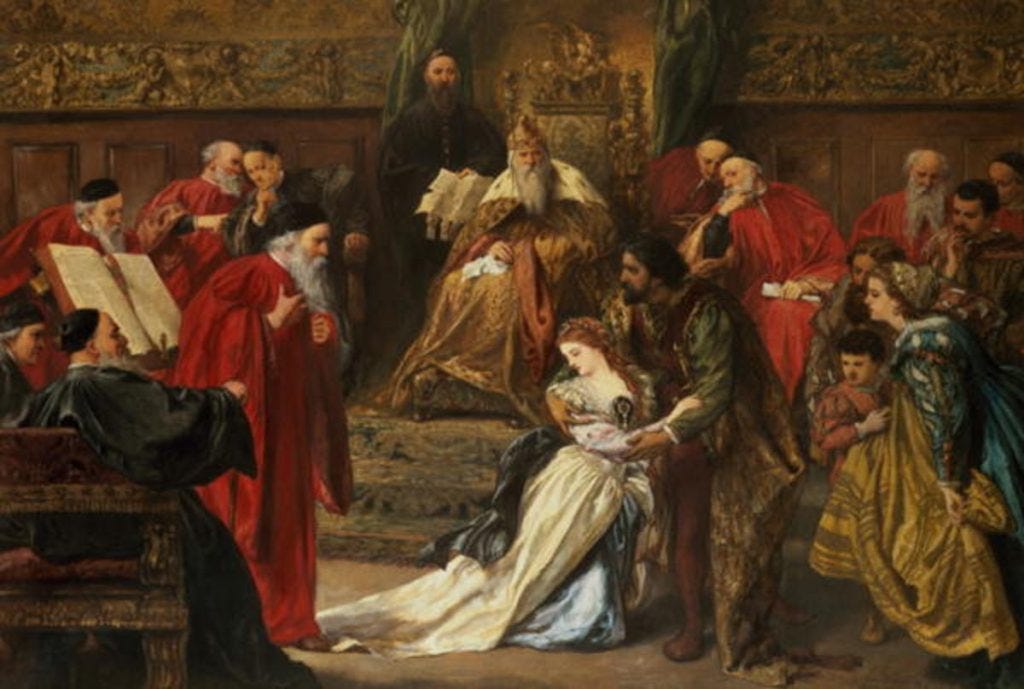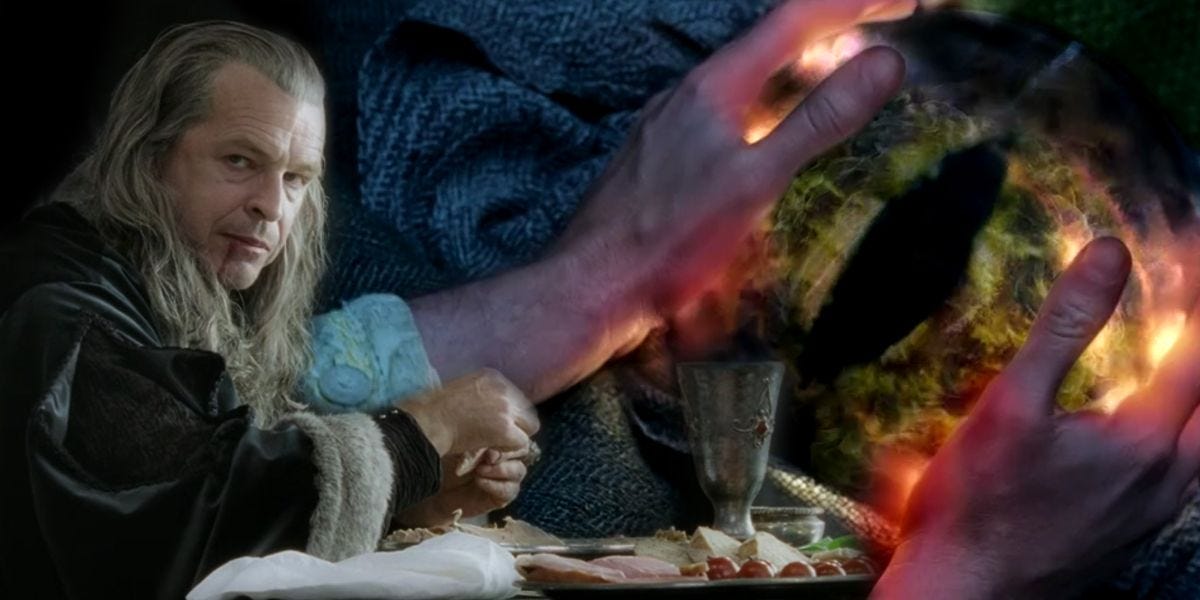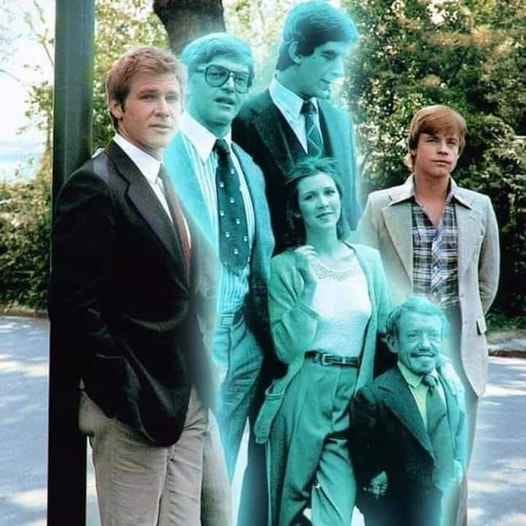“O Death, where is thy sting?” Part 1
Approaches to death as illustrated by Denethor, Theoden, and King Lear
(If you like this post, selecting the ❤️ to bless the Algorithm Angels.)
In The Lord of the Rings: The Return of the King, we encounter the deaths of two characters: Denethor, High Steward of Gondor, and Théoden, King of Rohan. Although both characters die and both are in similar positions of high authority, Tolkien’s depictions of those deaths are distinctly different. The same can be said of Shakespeare’s characters in The Tragedy of King Lear which, like Tolkien’s examples, provide a perspective on what makes a death tragic or victorious, both in fiction and in real life.
Denethor’s tragic death
Denethor’s is clearly a tragic death, which concludes Denethor’s overall tragic character arc. Through his indiscriminate use of the Palantir (an ancient artifact), he’s exposed himself to the evil influences of both the dark lord Sauron and the fallen wizard Saruman. After he learns of the death of his favored son, Boromir, and sees the approaching darkness of Sauron’s armies, he rejects the counsel of the good wizard, Gandalf, and falls into despair. He then decides (Chapter VII) to set himself ablaze on a funeral pyre with his injured son, Faramir, whom he thinks is also dead.
“Denethor has gone to the tombs,” said Pippen [reporting to Gandalf], “and he has taken Faramir, and he says we are all to burn, and he will not wait, and they are to make a pyre and burn him on it, and Faramir as well.” (126)1
When Gandalf and Pippen confront him, Denethor defends his madness:
“Where is your son, Faramir?” [asks Gandalf].
“He lies within,” said Denethor, “burning, already burning. They have set a fire in his flesh. But soon all shall be burned. The West has failed. It shall go up in a great fire, and all shall be ended. Ash! Ash and smoke blown way on the wind! … Battle is in vain. Why should we wish to live longer? Why should we not go to death side by side?” (129)
After some further debate, Denethor ignites the pyre and leaps upon it:
…and standing there wreathed in fire and smoke he took up the staff of his stewardship that lay at his feet and broke it upon his knee. Casting the pieces into the blaze he bowed and laid himself on the table, clasping the Palantir with both hands upon his breast. And it was said that ever after, if any man looked in that Stone, unless he had a great strength of will to turn it to other purpose, he saw only two aged hands withering in flame. (131)
Tolkien then underscores the tragedy of the death in the next paragraph:
Gandalf in grief and horror turned his face away and closed the door. For a while he stood in thought, silent upon the threshold, while those outside heard the greedy roaring of the fire within. And then Denethor gave a great cry, and afterwards spoke no more, nor was ever again seen by mortal men. (131)
The movie version, which you’re probably familiar with, is more visual but no less tragic:
Théoden’s victorious end
Like Denethor, King Théoden also despairs along his character arc. During the Battle of Helm’s Deep in Chapter VII of The Lord of the Rings: The Two Towers, he almost surrenders to hopelessness:
“I fret in this prison,” said Théoden. “If I could have set a spear in rest, riding before my men upon the field, maybe I could have felt again the joy of battle, and so ended. But I serve little purpose here. … It I said that the Hornburg has never fallen to assault, but now my heart is doubtful. The world changes, and all that once was strong now proves unsure. How shall any tower withstand such numbers and such reckless hate? … The end will not be long.” (155)
Unlike Denethor, however, Théoden realizes that to die courageously is a far better fate that dying a coward, and so he elects to ride out to meet the enemy:
“But I will not end here, taken like an old badger in a trap. … When dawn comes, I will bid men sound Helm’s horn, and I will ride forth.” (155-156)
His troops, which a short time before also felt hopelessly outnumbered, rally to victory, aided by the timely arrival of Gandalf and a great host of Rohan’s horse cavalry that he had mustered.
Here’s the movie version of that scene (which draws out Théoden ’s despair more clearly such that he needs a little prodding from Lord Aragorn):
Later, in Chapter V of The Return of the King, Théoden’s courage rises further as he exhorts his troops before personally leading them into the Battle of the Pelennor Fields:
“Now is the hour some, Riders of the Mark, sons of Eorl! Foes and fire are before you, and your homes far behind. Yet though you fight upon an alien field, the glory that you reap there shall be your own for ever. Oaths ye had taken: now fulfill them all, to lord and land and league of friendship! … Forth now, and fear no darkness!” (108-109)
…
Rising in his stirrups [Théoden] cried in a loud voice, more clear than any there had ever heard a mortal man achieve before:
Arise, arise, Rider of Théoden !
Fell deeds awake: fire and slaughter!
spear shall be shaken, shielf be splintered,
a sword-day, a red day, ere the sun rises!
Ride now, ride now! Ride to Gondor!…
Suddenly the king cried to Snowmane and the horse sprang away. Behind him his banner blew in the wind, white horse upon a field of green, but he outpaced it. After him thundered the knights of his house, but he was ever before them.
In the battle (Chapter VI), Théoden is mortally wounded at the hands of the terrible Witch-King of Angmar, an undead Ringwraith, who is subsequently defeated by Théoden ’s niece, Éowyn and the hobbit Meriadoc (Merry). In a deeply touching moment shortly before he leaves his body, Théoden expresses (to Merry in the book, to Éowyn in the movie) the knowledge that he’s come to the right place, spiritually:
“My body is broken. I go to my fathers. And even in their mighty company I shall not now be ashamed. I felled the black serpent. A grim morn, and a glad day, and a golden sunset!” (116)
Again, the movie version, which expresses his spiritual victory quite powerfully:
What makes death tragic or victorious?
Clearly, there is a stark difference between these two deaths. Denethor’s is tragic because he fails to overcome his despair. Had Théoden similarly fallen into despair at Helm’s Deep, he would have suffered shame when he faced his forebears in the hereafter. Instead, Théoden dies victoriously, completing a heroic rather than a tragic arc. We, as readers, may feel some sadness in his passing, yet we intuitively celebrate the state in which Théoden exits the stage.
These two literary examples illustrate that what matters in death, whether for fictional characters or real people, is not death itself, which is unavoidable, but the manner in which they approach and then enter into that transition. Put simply, one’s attitude toward death is a key differentiator between a spiritual outlook and a worldly, material, or merely emotional one. Writing fiction with spiritual, devotional, and mystical realism, then, must necessarily consider this distinction.
To see and/or treat death as only tragic and saddening reveals a worldly attitude, one that even denies the inevitability of death.
You may have seen one of those meme graphics of actors from highly popular movies in which those who are still living are shown in full contrast whereas those who’ve passed aware are made into specters. Oftentimes, such images are posted on social media when another actor or actress passes away with a comment like, “So sad.”
Although I empathize with the sadness people feel at such “losses,” I don’t empathize much with sadness over the fact of death itself. For death comes to everyone2 and there is a time in the future when, with 100% certainty, everyone in those images will be faded out, as will everyone reading this post.
Thus the important question is again: how does one approach and meet that transition of death? My hope for everyone is that they do so with a sense of accomplishment and growth, with a sense of having overcome or made progress against one’s lower nature (such as despair, selfishness, etc.). For, spiritually speaking, to make such progress means to have lived in greater attunement with the soul’s inherent divine nature and in greater attunement with God’s grace. It also means moving upwards on the spectrum from the self-comforter to the self-transcender (as discussed in Everyone is seeking God but most don’t know it). In short, such spiritual growth means to have become, in some way, a more complete human being, which marks a life of victory.
Fiction that seeks to express spiritual, devotional, and mystical realism, then, must necessarily depict at least some degree of this attitude. It’s also to acknowledge the existence of an eternal soul—and a conscious existence at that—apart from the body such that the death of the body is not seen as an annihilation but merely a release from the physical vehicle. Indeed, a truly spiritual attitude suggests that the consciousness with which one faces the “final exam” of life is the primary concern.
Contrasting character deaths in King Lear
As part of my son’s senior year of homeschooling before he heads off to college, we’re spending time with Shakespeare’s plays. Specifically, we’re following the text while listening to audio performances on Librivox because Shakespeare’s plays were written to be heard and seen, not just read. Then after each play we watch a few academic discussions on The Grant Courses Plus.
Not long ago we finished The Tragedy of King Lear, a tale in which most of the characters are dead by the end of Act 5. In fact, Shakespeare spares only one main character, Edgar, who inherits the thankless task of salvaging whatever’s left of England in the wake of Lear’s dreadful decisions of Act 1 Scene 1.

In a “tragedy,” each of these deaths, at first glance, seem tragic, especially if your view of death is one of unassuageable sadness. If you take a more spiritual view, however, then matters change dramatically, for the heroic characters in King Lear die in manners that are highly noble and honorable. Lear himself is a prime example. At the beginning of the play, we see a vain and selfish old man, but he doesn’t die with that same consciousness. To quote my son’s response paper:
[Lear’s] death in act five shows how much he has changed. After Cordelia is murdered by Edmund, a decrepit Lear holds his daughter, mourning her by continuously insisting that she could not be dead, all while he is paying no attention to himself. Soon he dies, but he does so with his mind focused not on himself, nor even upon the fear of oblivion, but rather on his daughter. Lear spends his final moments caring for another above himself. This, combined with his suffering (that is, his paying off his karmic debt) earlier in the play, ensures that while Lear dies, he leaves his life in a better [state of mind]. Many other characters in King Lear meet their tragic end in a worse place, spiritually, in which they began, but Lear dies in a better place, making his death less tragic and more hopeful for his own soul.
In fact, it’s clear that all the noble characters who die in the play, including Cordelia, Gloucester, and Kent, strengthen their noble qualities. The villainous characters, on the other hand, such as Edmund, Goneril, and Regan, all meet tragic ends, for their choices in life served only to reinforce their lower natures. Ultimately, I think that’s a core theme of King Lear and arguably gives the play a spiritual flavor.
Coming up in part 2
In the next post, we’ll continue our exploration with examples from Franz Werfel’s The Song of Bernadette and Lloyd Douglas’ The Robe, as well as examples of victorious passings in real life taken from my own experience of living in spiritual community.
Until then, share your thoughts in the comments.
(If you like this post, selecting the ❤️ to bless the Algorithm Angels.)
Page numbers in this section are from the Ballantine Books paperback editions.
Excepting those who achieve union with God and thus have the option of remaining in the body at will. Even then, most choose to vacate their physical forms. One exception is the account of Mahavatar Babaji related by Paramhansa Yogananda in Chapter 33 of Autobiography of a Yogi (1946 Edition), who specifically demonstrates the possibility of bodily immortality.





